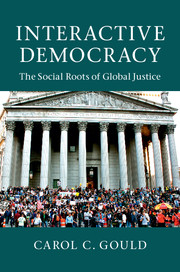Book contents
- Frontmatter
- Dedication
- Contents
- Acknowledgements
- Introduction
- Part I A theoretical framework
- Part II The social roots of global justice
- Part III Interactive democracy – transnational, regional, global
- 11 Diversity, democracy, and dialogue in a human rights framework
- 12 What is emancipatory networking?
- 13 Structuring transnational democracy: participation, self-determination, and new forms of representation
- 14 Democratic management and international labor rights
- 15 Regional vs. global democracy: possibilities and limitations
- Works cited
- Index
- References
13 - Structuring transnational democracy: participation, self-determination, and new forms of representation
Published online by Cambridge University Press: 05 September 2014
- Frontmatter
- Dedication
- Contents
- Acknowledgements
- Introduction
- Part I A theoretical framework
- Part II The social roots of global justice
- Part III Interactive democracy – transnational, regional, global
- 11 Diversity, democracy, and dialogue in a human rights framework
- 12 What is emancipatory networking?
- 13 Structuring transnational democracy: participation, self-determination, and new forms of representation
- 14 Democratic management and international labor rights
- 15 Regional vs. global democracy: possibilities and limitations
- Works cited
- Index
- References
Summary
Introduction
What sort of democratic political transformations will be needed to empower the emerging transnational communities that are growing in importance as the sovereignty of traditional nation-states is becoming partially eroded? With the intensification of economic globalization, the increase in shared ecological and economic interests across borders, extensive migrations, and transnational social movements, we can ask what political and social forms would enable a measure of democratic control over these transnational phenomena on the part of people involved in them or else deeply affected by them. Currently, much global economic activity involves forms of transnational power exercised by large corporations, accompanied by wide inequalities and severe ecological problems. At the same time, politicians within nation-states seem unable to deal with these consequences and are generally unresponsive to constituent needs. In this situation, it is not surprising that many people feel that they lack any democratic say over the conditions of their own life activity. With the growth of global governance institutions, nation-states are no longer the only significant actors in international politics, as Buchanan and Keohane have argued. We can ask, looking ahead, what would effective democratic reforms look like at the transnational democracy level? Would full global democracy be a solution here and would it be desirable?
Where it is not rejected altogether, global democracy is often thought of in either/or terms: either it entails the implementation of full-scale world government, or else it is limited to innovations within the existing system of nation-states and international organizations, in particular, the introduction of loose federations of nation-states at regional or international levels, or else the strengthening of existing international institutions, for example, through the addition of a Global People’s Assembly at the UN. This characterization of the options omits a distinctive feature of contemporary globalization, namely, the emergence of cross-border communities and transnational associations, which require new ways of thinking about the norm of democracy in a deeply interconnected world.
Information
- Type
- Chapter
- Information
- Interactive DemocracyThe Social Roots of Global Justice, pp. 226 - 241Publisher: Cambridge University PressPrint publication year: 2014
